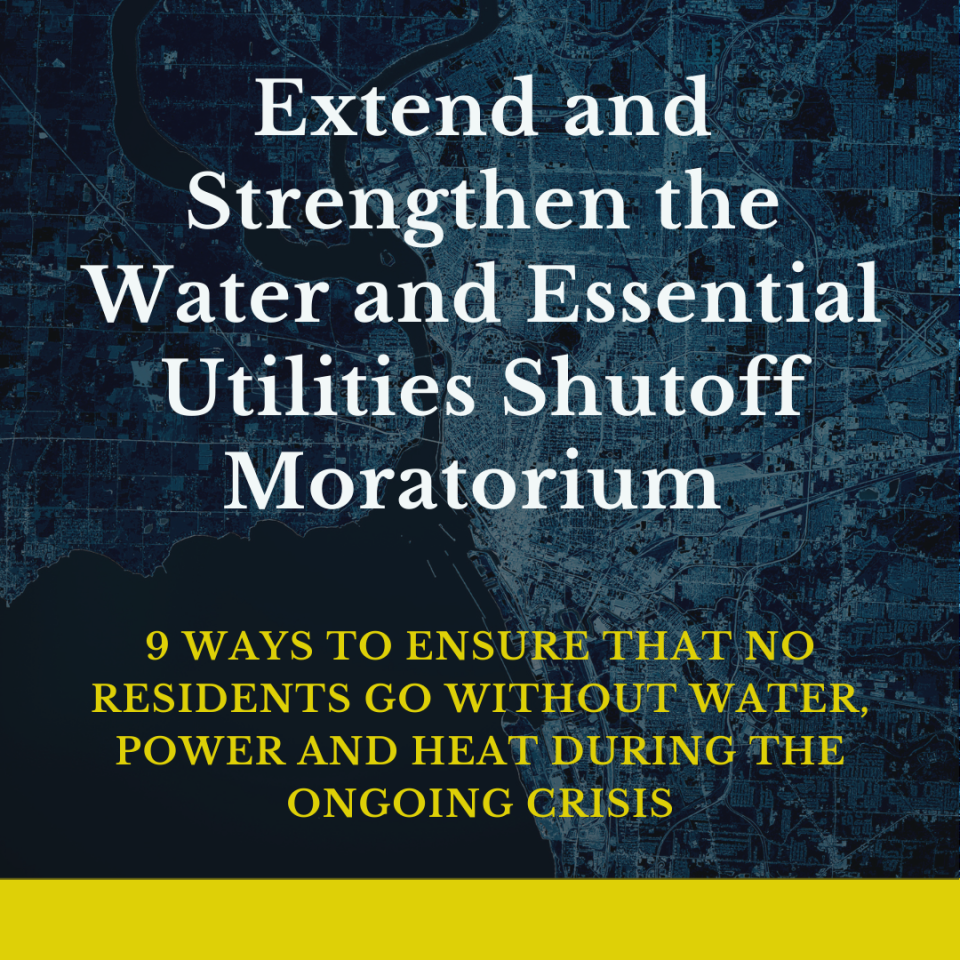News Take Action
Buffalo Organizations Join Statewide Call to Strengthen Water and Utilities Shutoff Moratorium
| Date: | March 24, 2021 |
| Share: |

Together with a statewide coalition, local organizations PPG, WNY Law Center, Center for Elder Law and Justice, PUSH Buffalo, and Buffalo Niagara Waterkeeper call on the state legislature to strengthen the existing water and essential utilities shutoff moratorium. The letter below outlines nine ways to ensure that no New Yorkers go without water, power, and heat during the ongoing crisis, nor are punished for being unable to afford their bills.
March 23, 2021
New York State Legislature
New York State Capitol
State Street and Washington Avenue Albany, NY 12224
Dear Assembly Speaker Heastie and Majority Leader Stewart-Cousins,
We are grateful for the Legislature’s commitment to maintaining New York’s moratorium on utility shutoffs during the COVID-19 pandemic.
Last year, the Legislature passed critical legislation to ensure that New Yorkers have access to water and other essential utilities during the crisis. A recent study by Duke University and the National Bureau of Economic Research confirms that utility shutoff moratoria prevent COVID-19 infections and save lives. New York’s moratorium will expire on March 31, creating an urgency to extend the moratorium and guarantee there are no gaps in service.
We applaud the leadership of Senator Parker, Assembly Member Peoples-Stokes, and Assembly Member Richardson in introducing bills that would maintain the moratorium, Senate bill S.1453A, Assembly bill A.6609, and Assembly bill A.6255, respectively. This letter identifies nine ways the existing moratorium should be strengthened to ensure that no New Yorkers go without water, power, and heat during the crisis, nor are punished for being unable to afford their bills.
1. Require all community water systems and wastewater systems to comply with the law’s provisions, and ensure that all households are covered. Small community water systems, such as in mobile home parks and homeowners’ associations, are not covered by New York’s current shutoff moratorium. Those living in a multi-use building not classified as “residential” by the water utility also appear to be excluded.
2. Prohibit the placement, sale, and enforcement of water and sewer liens during the emergency and a recovery period of 180 days minimum. Some local governments, including New York City’s, place a lien on a customer’s home if they cannot pay their water or wastewater bills, which can result in foreclosure.
3. Strengthen the law’s enforcement provisions. The Department of Public Service should be given the authority to investigate complaints and pursue administrative enforcement actions, and the Attorney General’s office should be authorized to enforce the law and receive complaints.
4. Automatically trigger a moratorium on utility shutoffs when any state of emergency is declared by the governor. This will ensure that New Yorkers are protected against losing utility services during future crises.
5. The proposal should take effect immediately upon passage. This will ensure there is no lapse in shut-off protections between the governor’s monthly extensions of the state of emergency and passage of the legislation.
6. Require utilities to notify customers of their rights with each utility bill and develop a standardized notice that utilities must disseminate to inform customers of their legal rights. A one-time notice, as under the existing law, is insufficient. Moreover, they must use a model notice issued by the Department of Public Service.
7. Require that the extended protection period continue for at least 180 days after a state of emergency ends. Moreover, the Department of Public Service should be given the authority to extend protections beyond 180 days when necessary. (In addition, to shutoff protections, the bill’s extended protections include applying the Home Energy Fair Practices Act’s “deferred payment agreements” rights to water customers.)
8. Require immediate, proactive, and safe reconnection of all customers disconnected from service, regardless of when disconnection occurred. The existing law requires reconnection only of customers disconnected during the state of emergency. However, some New Yorkers may have experienced a shutoff before a state of emergency is declared, and would therefore remain disconnected when a state of emergency begins.
9. Prohibit the charging of interest and reconnection fees, selling of consumer debt to a collection agency, and reporting of consumer debt to a credit agency. Similar to recommendation #2, these policies will guard against utilities pursuing other forms of punitive actions against New Yorkers who cannot currently pay their bills.
We appreciate your continued leadership on protecting public health and struggling families during the COVID-19 crisis. We look forward to working with you to enact the strongest consumer protection policies in the nation.
Thank you for your consideration.
Eric Weltman
Senior Organizer
Food & Water Watch
Dr. Hazel Dukes
President
NAACP New York State Conference
Larry Levine
Director Urban Water Infrastructure & Senior Attorney
Natural Resources Defense Council
Robert Hayes
Director of Clean Water
Environmental Advocates of New York
Kristy Meyer
Associate Director
Freshwater Future
Kevin Quinn
Supervising Attorney
Center for Elder Law & Justice
Elizabeth Moran
Environmental Policy Director
NYPIRG
Jonathan Westin
Director
New York Communities for Change
Joe Kelemen
Executive Director
Western New York Law Center
Andrea Ó Súilleabháin
Executive Director
Partnership for the Public Good
Rahwa Ghirmatzion
Executive Director PUSH Buffalo
Karen Mejia
City Councilmember, Newburgh
Co-Chair of Local Progress NY
Jill Jedlicka
Executive Director
Buffalo Niagara Waterkeeper